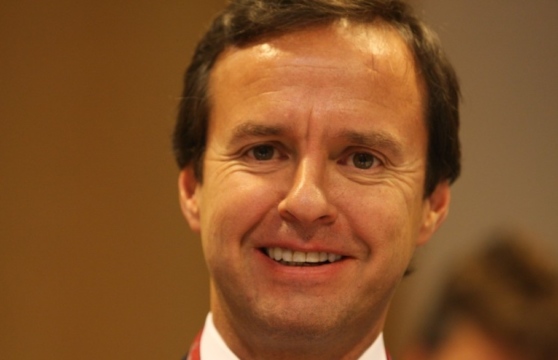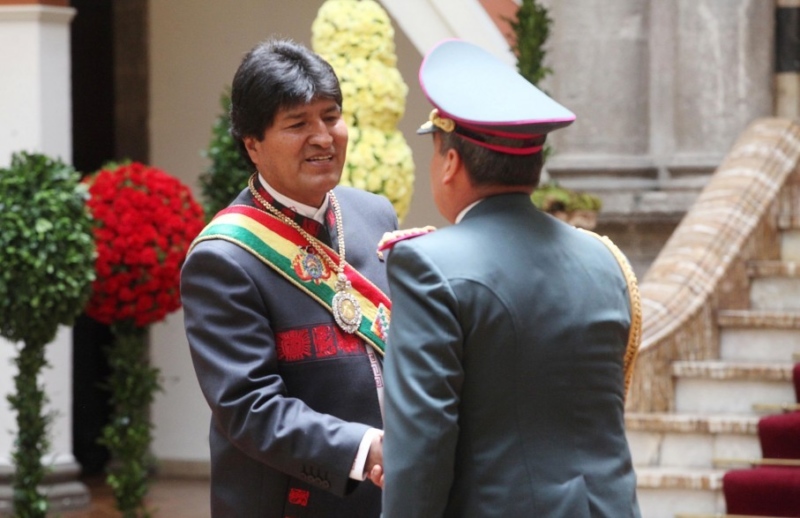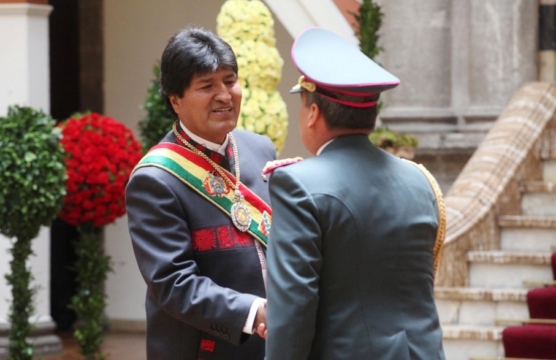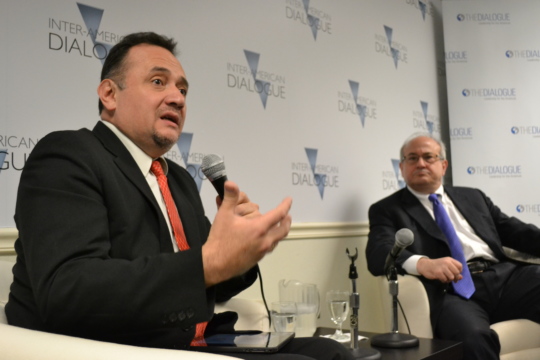
A Conversation with Jorge Quiroga
In early October, Morales announced he will run for a third presidential term . Is democracy under seige?
Q: Bolivian President Evo Morales won re-election on Sunday, Oct. 12 with an estimated 60 percent of the vote. What can investors expect from another Morales administration? What do Sunday's legislative election results suggest about Morales' governing strength and maneuverability moving ahead? Will anticipated lower prices for natural gas, an important export commodity for Bolivia, undermine the recent momentum in the economy? What economic priorities would you advise Morales to set for his next term?
A: Miguel Centellas, assistant professor of political science at Jackson State University in Mississippi: "I'm not sure what impact if any Evo Morales's re-election will have on investors. After governing for nearly a decade, his policies seem pretty clear. If anything, investors—who prefer stability over all else—should have been more nervous if Morales had lost. For all his flaws, Morales has steered Bolivian economic policy in a generally positive direction. Certainly, lower gas prices will have an impact. But unlike Venezuela, Bolivia has been conservative, stockpiling large cash reserves and spending rather frugally on social policy. The push to diversify exports and expand the domestic manufacturing base will likely continue. What many supporters will expect, however, is an increase in social spending in areas like education and health care—areas that have improved under Morales, but still have significant needs. Morales should look to the future and invest in children rather than pensioners, which is more popular politically. Support for Morales and his MAS party has plateaued and diversified. Preliminary results show Morales winning five points less than—while also winning more departments than—he did in 2009. But this means his support fell in traditional bases of support, even as it increased in the lowland regions. MAS is less polarizing than before, at least regionally. It also looks like MAS might have lost seats in the legislature, and will not count on a two-thirds supermajority. All this this could have a strong moderating force on Morales and his party, if it truly becomes a large 'national-popular' party like the 1950s MNR."
A: César Arias, associate director of Latin American sovereigns at Fitch Ratings: "Fitch placed Bolivia's BB- ratings on positive outlook in August, highlighting the country's strong economic performance and favorable reform momentum. The economy grew by a record 6.8 percent in 2013 and could expand by 5.2 percent in 2014-2016. President Morales is likely to use his renewed electoral mandate, solid legislative majority and rising regional support to accelerate infrastructure investment, industrialization policies and anti-poverty programs in 2015-2020. With most political obstacles overcome after the general elections, success will largely depend on the government's capacity to develop new natural gas reserves. The prospect of a new hydrocarbons regime is yielding positive results. The legislature approved seven exploration contracts and will study eight more association agreements with foreign companies and subsidiaries of the state-owned YPFB. These agreements could increase investment in exploration and prevent projected difficulties to meet the gas requirements from the local market and export contracts with Argentina and Brazil in 2017-2018. Similarly, a new investment promotion regime, if effectively implemented, could reduce regulatory uncertainty, nationalization risks and encourage greater private participation in the economy. Broader access to external borrowing sources mitigates financing risks for the ambitious public investment agenda, particularly in the event of lower gas export prices and tighter international liquidity conditions. Bolivia intends to maintain an active presence in capital markets after the issuance of $1 billion in global bonds in 2012-2013 and announced plans to negotiate up to $3 billion in infrastructure and mining bilateral loans from China in 2015-2020."
A: Jaime Aparicio Otero, former Bolivian ambassador to the United States: "With 60 percent of the votes, President Morales secured an unconstitutional third term. The election news came as no surprise. There is no question that the average Bolivian has seen a clear improvement in the standard of living under Morales' government. Regrettably, it has come at the expense of democracy, freedom and rule of law. Bolivia is a dysfunctional democracy benefiting from high commodity prices. During his celebratory speech, Morales dedicated his victory to Fidel Castro, Hugo Chávez and to all the anti-capitalist governments around the world. He also blasted the Pacific Alliance (Chile, Colombia, Mexico and Peru), accusing them of 'joining the Washington Consensus.' Although Morales' populist rhetoric does not bring fresh air to potential U.S. investors, it is possible that beyond his inflammatory speeches, the shadows of a major slowdown in the economies of emerging markets, and lower gas prices, may bring a more pragmatic approach toward foreign investment. As Professor James Petras points out, Bolivia has 'a very astute political regime which successfully manipulates radical rhetoric and applies orthodox economic policies. Morales has secured a political-economic formula which has succeeded in gaining the support of Fidel Castro and the IMF, the agro-oligarchy and the indigenous peasant coca farmers.' In the long-term perspective, Bolivia is far from overcoming the challenges of building a more sustainable economy that is able to generate value and transform natural resources into a productive force. Unless President Morales, the last 'caudillo' of the socialism of the 21st Century, decides to tackle structural problems (productivity, education), its largest economic boom is at risk of becoming the greatest missed opportunity in Bolivian history."
A: Kathryn Ledebur, director of the Andean Information Network in Cochabamba: "Investors can expect a continuation of policies that have boded well macroeconomically and electorally. Morales' MAS party should be close to, but may not attain, the two-thirds congressional majority needed to change the Constitution, but it will have the means through executive action to implement key policy initiatives and enough backing to push through its legislative agenda. The IMF projects that international natural gas prices will remain stable through 2018, and Bolivia's gas industry is not vulnerable to short- or intermediate-term price fluctuations. Contracts with its largest export partners, Brazil and Argentina, extend to 2019 and 2025 with prices currently set at double U.S. rates. Although Bolivia increased its gas production almost 500 percent between 2006 and 2003 and even more in 2014, the country has not yet reached the maximum exportation ceilings set in these contracts. In short, current exports can expand to meet high demand for Bolivian national gas. Furthermore, Bolivia has invested income from its international reserves in infrastructure improvements to successfully attract additional foreign investment and provide a safety net to weather any economic downturn. Economic priorities should be furthering expansion of social and basic services including potable water, healthcare, education, infrastructure, as well as continued pragmatic fiscal policy."
A: Delfina Cavanagh, associate director at the sovereign and international public finance group at Standard & Poor's: "We expect that economic policy will remain broadly pragmatic, reflecting the government's need to encourage foreign and private firms to invest and introduce new technology to expand output in key sectors of the economy, such as hydrocarbons and minerals. Sustaining both private and public investment will remain a key priority for long-term economic growth. We also expect the government to continue to pursue an ambitious program of social and infrastructure development broadly along the lines of his previous years in office. Still, the Morales administration will remain vulnerable to social unrest and demands for higher wages, especially from social groups that carry clout within the governing political party. Continued investment, consumption and gas production should sustain GDP growth above 5 percent in 2014 and likely at about 4.6 percent on average in the next three years. Commodities comprise more than 80 percent of total exports, and about one-third of fiscal revenues (tax revenues and royalties) comes from the hydrocarbon sector. Sustaining recent high GDP growth rates and booming exports will depend on the government's ability to encourage nonstate firms to undertake exploration work by providing sufficient incentives within the current legal framework. It would also depend on the government's ability to adequately manage public-sector enterprises such that they continue to generate resources to make more investments. Higher output, would, at least partially, compensate for a potentially sharp fall in commodity prices. Also, Bolivia is likely to make gradual progress in creating a longer chain of production using natural resources by building downstream industries, especially in petrochemicals, gradually diversifying the economy."
A: Roberto Laserna, director of the Center for the Study of Economic and Social Reality (CERES) in Cochabamba: "In his previous administrations, President Morales had electoral and social support, expanding its political power. He even changed the Constitution. And yet, governance, measured by the capacity of the government to implement and monitor its policies, was low, mostly due to weak institutions and lack of managerial skills. Moreover, clientelistic pressures absorbed much of the energies of the president and cabinet. These problems were disguised by the unprecedented flow of money from the exports boom. No matter how impressive they are, the Sunday ballots have not made those problems disappear. The prospects for the coming years are dim. Commodity prices are declining and so will exports. Industrial investors could not take advantage of the internal market because they fear changing policies on interest rates, labor costs and taxation. Consumption was supplied by imports on low exchange rates. The economy is more vulnerable and dependent on natural resources and exports than 10 years ago, despite its international reserves. The government ignored warnings and advice and lost opportunities to make a better use of the bonanza. It despised private investors and trusted its inexperienced bureaucrats, whose investment decisions failed one after the other: PDVSA exploring for oil, Jindal developing the iron industry, communities managing milk and coca plants, and so on. It is time to give private investors the legal certainty they need to do their job. Bolivia needs to reestablish the rule of law, to strengthen its institutions and to give the money, currently in the hands of the bureaucrats, to the citizens. Doing these would energize the productive capacities of the people."
In early October, Morales announced he will run for a third presidential term . Is democracy under seige?
With Morales’ approval rating at 75%, it is likely that voters will re-elect him for a third consecutive term
Una conversación con René Orellana, Ministro de Planeación del Desarrollo
 Presidency of Ecuador / CC BY-NC-SA 2.0
Presidency of Ecuador / CC BY-NC-SA 2.0

 Video
Video